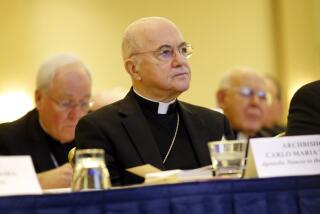A Cloud of Sexism Over the Church
- Share via
J’Accuse. That was the title of a famous protest letter by novelist Emile Zola, published in 1898.
In it, Zola accused the French military and government and the Catholic Church of a conspiracy to convict an innocent man, Alfred Dreyfus, of treason.
It is time, a century later, for a similar public charge to be made to Pope John Paul II and the Catholic hierarchy about another conspiracy, one that has gone on longer and with far more widespread consequences.
As a Catholic, the accusations I make are not directly against the current pope but against the men who institutionalized Christianity and so turned it away from some of the most important teachings of Jesus.
John Paul II’s mistake has been following their lead.
One of my students states the problem perfectly: “I have discovered that religion is the worst thing that happened to Christianity.”
This Easter season is an appropriate time to face what some aspects of organized religion have done to Christianity.
The cloud that hangs over our church is the dark shadow of sexism.
The sad and ironic history of the relationship between Christianity and women has a great deal to do with the current scandal in what remains an all-male institution.
The sort of revolution that is needed--and the sort I hope is now brewing--is for the church to go back to its source on matters of the sexes.
The pope has called for “a wholehearted reawakening of the ideals” of the priesthood. What is actually needed is a reawakening of the ideals of Jesus, which were subverted by the early church fathers.
The irony in the continuing attempts to restrict the role of women in the church is that the whole thrust of the teachings of Jesus was to adopt more “feminine” values and behaviors: turning the other cheek, being meek, merciful, peaceful.
Chaucer’s Wife of Bath may have been onto something when she said, “Christ was a maid, and yet shaped like a man.”
By reinforcing the idea that women are inferior, the institutionalized church has led men to fear, deny and repress the very tendencies and qualities that Jesus sought to cultivate.
Women were centrally involved in the birth of Christianity. They were disciples, prophets, the first to recognize Jesus as the Messiah and the essential witnesses to the events most basic to Christian belief: the death, burial and resurrection of Jesus.
But the men who took control of the Christian Church in the first few centuries after Jesus did their best to obscure the role of women.
Although three of the Gospels plainly state that the risen Jesus first appeared to Mary Magdalene, and women are prominently mentioned throughout Gospel accounts of the crucifixion and resurrection, St. Paul’s account of the first Easter and its aftermath sounds as if it took place in a men’s club: “He appeared to Peter, then to the 12. Then he appeared to more than 500 brethren at one time.... Last of all, as to one untimely born, he appeared also to me.”
Paul simply ignored the women.
The current pope’s immediate predecessor attempted to start correcting nearly 2,000 years of error.
On Sept. 10, 1978, Pope John Paul I declared that God is a mother as well as a father. Eighteen days later, he was dead. But John Paul II should not let that fact deter him from issuing a similar statement.
This Easter, the pope and his bishops should tell the story of the first Easter as it was.
They should accept Mary Magdalene as one equal to the apostles and so remove the contrived reason for barring women from the priesthood.
And while they’re at it, they ought to recognize that birth control is not a sin; the sin is telling poor people on an overpopulated planet that birth control is a sin.
This Easter, let’s save Christianity from the worst thing that happened to it.
Let us truly be able to say: “He/She is risen!”
More to Read
Sign up for Essential California
The most important California stories and recommendations in your inbox every morning.
You may occasionally receive promotional content from the Los Angeles Times.










